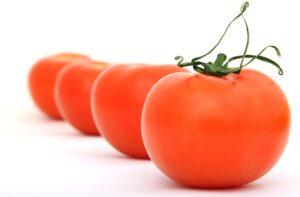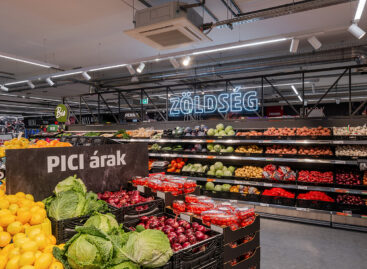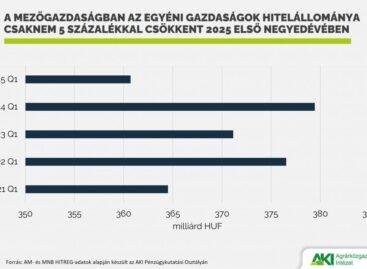We can be a decisive player in European tomato processing
Farmers engaged in industrial tomato production expect a good harvest this year as well. The success of the sector in recent years is well exemplified by the fact that products produced and processed in our country can be found not only on the shelves of domestic stores, but also in many European countries.

(Photo: Pixabay)
According to the joint forecast of the National Chamber of Agriculture and the Hungarian Vegetable-Fruit Trade Organization and Product Council (FruitveB), producers can harvest around 100,000 tons of tomatoes this year. The past few years have presented many challenges to domestic producers, despite this, the industrial tomato can be classified as one of the few vegetable crops that could end the past years successfully. According to area-based subsidies, industrial tomato cultivation took place on 1,417 hectares last year, and on 1,465 hectares this year. The largest proportion of the areas are located in the counties of Békés and Bács, and there is a pronounced concentration of producers around Szarvas, this year the harvest started later than planned, in the second half of August, and it is expected to last until the beginning of October.
Due to the low rainfall of the past two years, increased self-care was necessary on the plantations
Despite the drought, however, thanks to the warm weather favorable to industrial tomatoes, the producers were able to harvest tomatoes of good quality and Brix value. Farmers expect a similarly good harvest this year. According to the forecasts of the National Chamber of Agriculture and the Hungarian Fruit and Vegetable Association (FruitVeB), producers can harvest around 100,000 tons. Actual quantity and quality will be greatly affected by the weather during harvest. As a result of the rainy summer, there was a need for increased protection against phytophthora disease, against which the producers have successfully protected themselves so far, but the weather conditions of the next period may still be decisive. Rainy weather at the end of autumn can even cause a serious quality deterioration and crop loss.
100 percent of domestically produced free-range tomatoes go to domestic processors
In addition, raw materials are also supplied to the factories from neighboring countries – Romania and Serbia. The largest player in the market is responsible for the processing of approximately 1,060 hectares of domestic tomatoes, and the tomatoes harvested from the remaining areas are also utilized by domestic processors. Due to the modern delivery concept, harvesting and processing can be carried out at a continuous pace, which is favorable for both producers and suppliers. Many products are made from domestic tomatoes, from ketchup to various concentrates, which are not only found on the domestic market, but the producers also supply the surrounding European countries. Since the purchase price of tomato concentrate on the world market – as in recent years – continues to rise, favorable supplier conditions and cultivation technology are also a given, so the sector may face further development opportunities.
Due to the challenges of recent years, some of the farmers who grow crops in the fields see the potential of industrial vegetable production
It is conceivable that – as the grain market crisis drags on – the production area of industrial tomatoes in our country will also increase in the future. However, industrial tomatoes can only be grown economically in irrigated areas, so it would be important to increase irrigation capacities and expand the size of irrigated areas, which, however, is complicated by the current water rights permits and regulations. Another challenge is that in the European Union more and more plant protection active ingredients are being withdrawn, which greatly narrows the options for plant protection. Producer organizations would have a prominent role in increasing production capacities, which could provide our country with a jumping off point in the field of manufacturing products. The future of the sector will be discussed on June 9-12, 2024. between the 15th World Congress on Tomato Processing and the 17th International Symposium on Tomato Processing to be held in Budapest. At the event jointly organized by UNIVER, the World Processing Tomato Council (WPTC), the Hungarian University of Agriculture and Life Sciences (MATE) and the International Horticultural Science Society (ISHS), processors and specialists will meet producers, educators, researchers and students.
NAK
Related news
Now you can get the ingredients for Hungarian lecsó up to 20% cheaper at PENNY
The unmissable favorite of the summer season is fresh, homemade…
Read more >At the forefront of the domestic food industry for more than half a century
The future of the food industry is shaped by young…
Read more >Agricultural loans decreased by 6 percent
Agricultural loans decreased by 6.0 percent to HUF 1,001.2 billion…
Read more >Related news
Corporate leaders’ commitment to sustainability at record level
According to the latest data from the K&H Sustainability Index,…
Read more >FAO food price index rose slightly in June due to higher prices of meat, dairy products and vegetable oils
The Food and Agriculture Organization of the United Nations (FAO)…
Read more >What can cause the price of a wine to increase tenfold?
There are fewer of them worldwide than the number of…
Read more >






